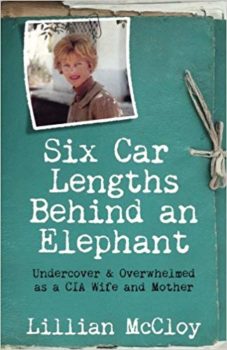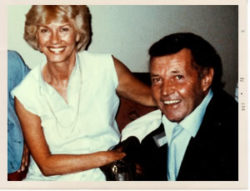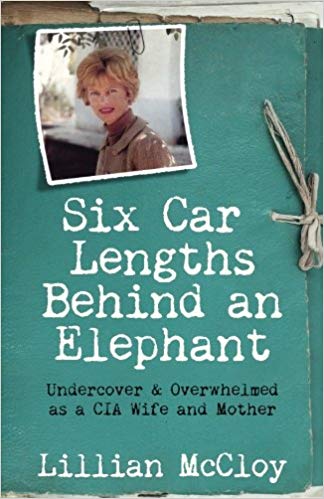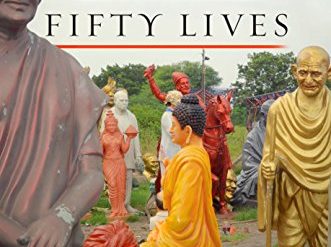
From 1964 to 1982, former Marine fighter pilot Frank McCloy served under deep cover in the CIA in Madrid, Delhi, Tokyo, and Caracas. But he was far from alone. His wife, Lillian, and three young children shared the experience with him of culture shock, life-threatening illness, and danger from lunatic drivers and dismissed servants. And five years after Frank’s untimely death in 1986, Lillian McCloy began writing about that experience in a revealing memoir, Six Car Lengths Behind an Elephant.
An insightful peek into the spy game
Lillian’s younger daughter, Berkeley television and film actress Johanna McCloy, edited the book. It’s charming, often troubling, and sometimes hilarious and is altogether a fascinating read. If you enjoy spy novels, or nonfiction books about espionage, you’ll find this engaging little book an insightful peek into the often harsh reality of the spy game.
Six Car Lengths Behind an Elephant: Undercover & Overwhelmed as a CIA Wife and Mother by Lillian McCloy (2016) 250 pages ★★★★☆
James Bond would never have put up with this
Even today, the expatriate life can be challenging. But, nearly half a century ago, living in a hardship post such as Delhi or Caracas could easily have been a nightmare for a middle-class American. Both cities are much more developed today. And there is today a large and growing middle class in India, which was not the case in the 1970s. (That was true in recent years in Venezuela as well, although the country’s mismanagement and turmoil appears to have changed that.) But both countries were desperately poor in the 1970s. Having lived in such a place for several years in the late 1960s, I can vouch for the essential truth about culture shock that comes to light in this book.
Of course, for those expats affiliated with the US Embassy, the commissary and PX softened the blow by offering a wide range of American goods otherwise unavailable in the countries where the McCloys served. In fact, many expats manage to isolate themselves almost completely from the local culture. But there were no commissary privileges for the McCloys, and rarely even enough money to live as well as they had at home. And since Frank was working under deep cover, the family didn’t even have access to Embassy-approved medical facilities.

An early exit strategy from India
In fact, just a few days after the family arrived in Delhi in 1972, it became obvious that life there would be a daily trial and frequently dangerous. So, Frank rushed to a travel agent “and said he wanted to book a one-way flight for five on the first plane to leave New Delhi two years hence, on July 17th. The travel agent was dumbfounded. ‘Really,’ she said, ‘and where do you want to go?’ Frank said it didn’t matter, but it had to be the first flight of the day.” Frank and Lillian then counted the days and hours for two years until they could board the plane to leave India—a 4:00 am Lufthansa flight for Frankfurt.
Under deep cover in the CIA
Lillian goes to great lengths to emphasize that Frank was not living the life of James Bond. He didn’t carry a weapon. He had virtually no contact with anyone else in the Agency other than his case officer, and sometimes not even him. The salary and bonuses he received as a manager for the cover companies who employed him went straight to the CIA. He and his family were forced to live on meager Agency pay, which was far from adequate in such expensive cities as Tokyo and Caracas. And CIA accountants relentlessly nickel-and-dimed the couple on their expense account. In fact, the Agency does not come across at all well in this book. (If I had succumbed to the Agency’s recruiting pitch in 1968, I suspect I would have quit within weeks. Yes, I too was an expat back in the day.)
A brutally honest memoir
Lillian McCloy is at times brutally honest in Six Car Lengths Behind an Elephant. She writes about the heavy drinking that seems to have been almost a job requirement for her husband’s work—and apparently for her as well. So, too, was the depression the drinking made worse. (In every post, the couple was known for its hospitality, frequently hosting parties where alcohol flowed freely.) She writes bitterly about the thieving servants, police officers, and government officials who were an unavoidable fixture of life in India. And she describes at length the unfounded suspicions she harbored about her husband, who was forced to travel frequently to contact the agents he ran.
However, at every post, and in virtually every chapter, Lillian found opportunities for humor. The stories about missing cultural clues, linguistic missteps, and simple human misunderstandings make for a lively and engaging account. They’re often laugh-out-loud funny (though that wasn’t necessarily the case at the time). Anyone who’s spent more than a few weeks living in a culture different from their own will recognize the experience.
“Most of the names have been changed”
As you might imagine, the CIA is not fond of its former employees telling tales out of school. I imagine that might be doubly true about agents operating under deep cover in the CIA. If Frank McCloy himself had attempted to write an account of his work experiences, it seems doubtful the book would ever have seen the light of day. But three decades later, Lillian was able to convey a vivid sense of the family’s experience. Even so, “[m]ost of the names have been changed to protect the innocent and the sly.” And that’s probably a good thing. Lillian’s views about most of the CIA officers she and her husband were forced to deal with were not good.
Where the title comes from
So, where, you might wonder, does that title come from? The answer lies in one of Lillian’s charming stories. When Frank was enrolled in a Japanese-language class in preparation for a new assignment in Tokyo, a young woman in the class “asked him, “‘What did your experience in India teach you?'” She was obviously expecting something about the spiritual insight he might have gained. But Frank “replied, ‘Always drive six car lengths behind an elephant.'” His and his family’s time in Delhi had been difficult, to say the least.
How this book came to be
Lillian McCloy, now 93, resides in Alameda, California, in an assisted living facility. According to Johanna McCloy, her mother had written the book during the early 1990s and secured an agent in New York in hopes of having it published there. But the book, offered under a pseudonym, didn’t sell then. After the manuscript had lain untouched in a box at Lillian’s home for two decades, Johanna decided to edit and publish it in 2016 as a gift for her mother’s 90th birthday. And now that Six Car Lengths Behind an Elephant is in print, Johanna reports, several film producers have shown interest in bringing the story to the screen.
For related reading
You’ll find fascinating detail about the author’s life before the CIA in her obituary in the San Francisco Chronicle: “Lillian McCloy, whose memoir of life married to a CIA officer thrilled spy novelists, dies at 97.”
I’ve also reviewed a memoir about life under Non-Official Cover by a former CIA officer who served much more recently: Life Undercover: Coming of Age in the CIA by Amaryllis Fox (Life undercover in the CIA chasing suitcase nukes). And, if you want to read a superb novel about similar experiences undercover, see Beirut Station: Two Lives of a Spy by Paul Vidich (A compelling spy novel about living a double life).
You might also enjoy my posts:
- The 15 best espionage novels
- Good nonfiction books about espionage
- The best spy novelists writing today
- Top 10 mystery and thriller series
And you can always find my most popular reviews, and the most recent ones, on the Home Page.


























